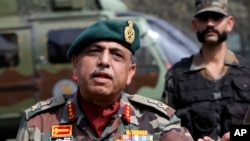NEW DELHI —
The Indian army has ended a two-week-long operation against heavily armed militants who it says tried to cross into Indian Kashmir with the support of the Pakistani army. It says eight militants have been killed. The latest fighting could set back recent efforts by India and Pakistan to bring calm to the Kashmir border, where tensions have been rising.
Senior Indian army commanders say soldiers recovered a large cache of sophisticated arms, including AK-47 rifles, communication equipment and night vision devices during the two-week-long battle with a large group of infiltrators who tried to enter Indian Kashmir from the Pakistani side.
The fighting took place in thick forests along the Himalayan slopes. Several Indian soldiers were injured in the operations.
Militants routinely attempt to cross into Indian Kashmir before the onset of winter to foment a revolt against Indian rule. But the army says the scale of this incursion has been the largest in the last decade.
Lieutenant General Sanjiv Chachra said the infiltration could not have been possible along the border, also known as Line of Control or LC, without the support of the Pakistani army.
“We are almost on eyeball to eyeball. We can see each other. At such a point in time for a large group of terrorists like this infiltrating, you mean to say it can be without the complicity of the Pakistani army? I mean this is ridiculous. So therefore tacit support along the LC [Line of Control] is always there. And if you see the quantum of arms and ammunition, most of the arms have got Pakistan markings. Yesterday, you were shown an identity card, you were shown a letter, all these are evidences. We don’t have to prove this," said Chachra.
The Pakistani army has denied the accusation.
The Indian and Pakistani prime ministers recently agreed to defuse tensions along the Kashmir border following a meeting in New York on the sidelines of the U.N. General Assembly. But the latest fighting and accusations by the Indian army are likely to set back their efforts to strengthen a cease-fire that has appeared more fragile following a series of clashes between Indian and Pakistani troops this year.
The Himalayan region of Kashmir is the core dispute between the two countries and has been the trigger for two of their three wars.
Efforts to find a solution have made no headway. While Pakistan favors mediation on the issue, India insists it is a dispute the two countries have to solve on their own.
Indian President Pranab Mukherjee repeated that position as he addressed reporters on a flight returning from an official visit to Turkey.
"Our approach in respect of Pakistan that it is essential bilateral issues, which are to be resolved between India and Pakistan themselves within the framework of Shimla agreement. Therefore, the question of any third country's intervention on this issue does not arise," said President Mukherjee.
Pakistan’s new government has pushed for peace talks with India, but New Delhi says Islamabad’s support for cross border militancy in Kashmir is the biggest hurdle to progress. Islamabad denies supporting militants to support an insurgency in Indian Kashmir.
Senior Indian army commanders say soldiers recovered a large cache of sophisticated arms, including AK-47 rifles, communication equipment and night vision devices during the two-week-long battle with a large group of infiltrators who tried to enter Indian Kashmir from the Pakistani side.
The fighting took place in thick forests along the Himalayan slopes. Several Indian soldiers were injured in the operations.
Militants routinely attempt to cross into Indian Kashmir before the onset of winter to foment a revolt against Indian rule. But the army says the scale of this incursion has been the largest in the last decade.
Lieutenant General Sanjiv Chachra said the infiltration could not have been possible along the border, also known as Line of Control or LC, without the support of the Pakistani army.
“We are almost on eyeball to eyeball. We can see each other. At such a point in time for a large group of terrorists like this infiltrating, you mean to say it can be without the complicity of the Pakistani army? I mean this is ridiculous. So therefore tacit support along the LC [Line of Control] is always there. And if you see the quantum of arms and ammunition, most of the arms have got Pakistan markings. Yesterday, you were shown an identity card, you were shown a letter, all these are evidences. We don’t have to prove this," said Chachra.
The Pakistani army has denied the accusation.
The Indian and Pakistani prime ministers recently agreed to defuse tensions along the Kashmir border following a meeting in New York on the sidelines of the U.N. General Assembly. But the latest fighting and accusations by the Indian army are likely to set back their efforts to strengthen a cease-fire that has appeared more fragile following a series of clashes between Indian and Pakistani troops this year.
The Himalayan region of Kashmir is the core dispute between the two countries and has been the trigger for two of their three wars.
Efforts to find a solution have made no headway. While Pakistan favors mediation on the issue, India insists it is a dispute the two countries have to solve on their own.
Indian President Pranab Mukherjee repeated that position as he addressed reporters on a flight returning from an official visit to Turkey.
"Our approach in respect of Pakistan that it is essential bilateral issues, which are to be resolved between India and Pakistan themselves within the framework of Shimla agreement. Therefore, the question of any third country's intervention on this issue does not arise," said President Mukherjee.
Pakistan’s new government has pushed for peace talks with India, but New Delhi says Islamabad’s support for cross border militancy in Kashmir is the biggest hurdle to progress. Islamabad denies supporting militants to support an insurgency in Indian Kashmir.









